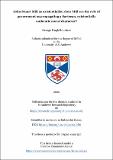Files in this item
John Stuart Mill as existentialist : does Mill see the role of government as propagating a Sartrean, existentially authentic moral character?
Item metadata
| dc.contributor.advisor | Ashford, Elizabeth | |
| dc.contributor.advisor | Etinson, Adam | |
| dc.contributor.author | Rountree, George Hugh | |
| dc.coverage.spatial | 117 | en_US |
| dc.date.accessioned | 2024-02-21T12:27:50Z | |
| dc.date.available | 2024-02-21T12:27:50Z | |
| dc.date.issued | 2022-06-13 | |
| dc.identifier.uri | https://hdl.handle.net/10023/29309 | |
| dc.description.abstract | The purpose of this thesis is to explore whether or not the goal of John Stuart Mill’s political philosophy could be described as existentialist. To do this, I will demonstrate that Mill’s philosophy was centred around the cultivation of an ideal individual moral character in the populace, and then I shall show that this moral character is a form of existential authenticity. It will first draw upon the interpretation by Jones of Mill’s philosophy that states that his political project was centred around an ideal of the individual’s life consisting in Victorian moral norms and the perfection of individual rationality. I will devote the first half of this essay to presenting, developing and defending Jones’ interpretation according to this moral character thesis. The second half of the paper will then examine whether or not this moral character could be described as an existentially authentic one. I will use Sartre’s account of authenticity as a framework against which to compare Mill’s moral character. I will then show that this account of authenticity is near identical to Mill’s moral character, despite the two authors working from different ontological frameworks of human action. I will demonstrate this not only by pointing out how the characteristics of each author’s ideal characters are the same, but also by noting that they respond to the same societal problems of alienation and custom and resolving them through the cultivation of free-thinking individuals who respect the freedom of others. Finally, I shall conclude that while Mill does have as the basis for his political project a distinctly existentialist notion of authentic existence, one could not describe him as an existentialist philosopher in the same manner as writers such as Sartre due to the presence in Mill’s philosophy of an abstract, objective normative ethics that existentialism inherently rejects. | en_US |
| dc.language.iso | en | en_US |
| dc.publisher | University of St Andrews | |
| dc.rights | Creative Commons Attribution-NonCommercial-NoDerivatives 4.0 International | * |
| dc.rights.uri | http://creativecommons.org/licenses/by-nc-nd/4.0/ | * |
| dc.subject | Mill | en_US |
| dc.subject | Sartre | en_US |
| dc.subject | Politics | en_US |
| dc.subject | Authenticity | en_US |
| dc.subject | Existentialism | en_US |
| dc.subject | Freedom | en_US |
| dc.subject | Government | en_US |
| dc.subject | Rationality | en_US |
| dc.subject | Moral | en_US |
| dc.subject | Ethics | en_US |
| dc.subject.lcc | B1607.R78 | |
| dc.subject.lcsh | Mill, John Stuart, 1806-1873 | en |
| dc.subject.lcsh | Existentialism | en |
| dc.title | John Stuart Mill as existentialist : does Mill see the role of government as propagating a Sartrean, existentially authentic moral character? | en_US |
| dc.type | Thesis | en_US |
| dc.type.qualificationlevel | Doctoral | en_US |
| dc.type.qualificationname | MPhil Master of Philosophy | en_US |
| dc.publisher.institution | The University of St Andrews | en_US |
| dc.identifier.doi | https://doi.org/10.17630/sta/786 |
This item appears in the following Collection(s)
Except where otherwise noted within the work, this item's licence for re-use is described as Creative Commons Attribution-NonCommercial-NoDerivatives 4.0 International
Items in the St Andrews Research Repository are protected by copyright, with all rights reserved, unless otherwise indicated.


